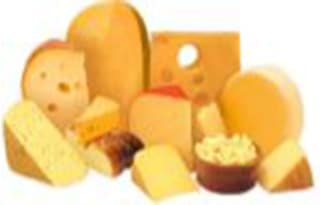The Value of Soft Cheeses

Why Should You Eat Soft Cheeses?
You have a variety of bacteria in your gastrointestinal tract – a perfectly normal situation. For our purposes, they can be divided into two groups: those that produce lactic acid and those that don’t. The ones that don’t are considered pathogens. The ones that do are to be encouraged because that lactic acid, along with an assortment of by-products, serves to suppress the growth of pathogenic bacteria.
Your body’s healthful state depends on a healthy population of lactic acid-forming, or “friendly” bacteria. Soft cheeses are great sources of live culture, friendly bacteria. Eating a variety of them will not only add more interest to your diet, but will also give you an assortment of different healthful bacteria.
By the way, there are health benefits from eating cheese that extend beyond whether or not they contain live cultures, so just because we ask you to focus on soft cheeses doesn’t mean that’s all you should eat. Hard cheeses, like cheddar, have high levels of butyric acid, which can help protect you against colon cancer for instance. So try not to focus on only one kind of cheese for the best health benefits.
But for now we’re going to focus on those important soft cheeses.
What ARE Soft Cheeses?
How do you know what a soft cheese is? It will generally have one or more of the following characteristics:
- When pressed with a finger, it may leave an indentation (Monterey jack, Havarti, mozzarella for example)
- It may have a pungent odor (bleu, Brie, Limburger)
- It might emit a gas that results in swelling of the wrapped package, or leaves holes in the cheese (Swiss, Jarlsberg, Lorraine Swiss)
Goat cheese is considered a soft cheese, and is particularly useful for binding toxic, free iron (more on this in a minute), or if you are not able to comfortably eat milk products. (That’s something we can help you with, too…but that’s for another post!)
What ISN’T a Soft Cheese?
Cottage cheese has low levels of friendly bacteria and lactose, and is not considered a soft cheese; but is a good cultured dairy food for other reasons. Because it has no lactose, it is easily digested, while being high in protein and low in carbohydrates, and of course, a great source of calcium. Ricotta cheese also falls within this category.
Even though processed American cheese or Velveeta® are soft in texture, they are not acceptable for our purpose. You want a naturally-cultured cheese…not one that’s artificially produced. Cheeses that are processed are done so using heat, which will kill friendly bacteria.
Cooking With Soft Cheeses
To gain the health advantages that live organisms provide, you will receive the most benefit from having your soft cheese uncooked. These foods maintain the ability to support the growth of organisms after being cooked, but at that point they no longer contain live cultures. So a quiche that contains soft cheese, for example, while healthful in other ways, will not serve the purpose of adding soft cheeses to your diet.
Remember, however, what we said before about eating a variety of foods. Cooked or heated soft cheeses are still useful in destroying free radicals. Therefore, while the act of melting or cooking may destroy the friendly bacteria, benefit can still be derived from it. So, while eating these foods in their natural state is preferred, don’t ignore recipes that call for cooking or melting these foods.
A Delicious Ending
Soft cheeses are wonderful for another reason – they are rich in iron-binding proteins. An unbound form of iron (called free iron) is necessary for pathogens to infect you, and for cancer to take hold and grow. Eating soft cheeses – in this case even cooked – will help your body bind up and carry out the free iron before it does any damage.
Infection also needs sugar for pathogenic bacteria to grow. You know how people in many countries will serve a cheese course at the end of a meal? This, it turns out, is another healthful habit that the rest of us could stand to adopt. When you DO have that occasional sweet dessert at the end of a meal, it would be wise to have a small piece of soft cheese when you’re done. Not only delicious, but a way to protect your body against infections and cancer.
Want To Know More?
We have two publications that much of this information has been condensed from. If you’d like to read more about the science and practical applications of using soft cheeses, please check out our Health Talk issue “Restoring the Normal Balance of Gastrointestinal Microorganisms, and Put Down The Duckie’s “Add A Little Culture To Your Life.”